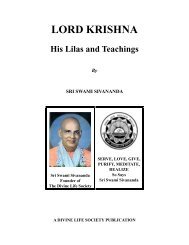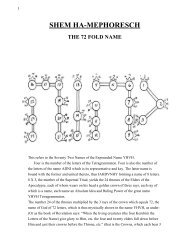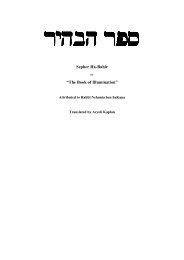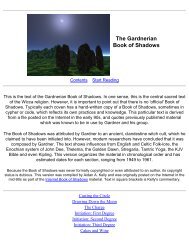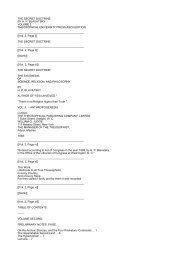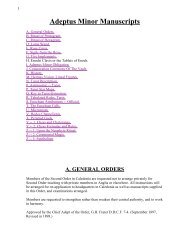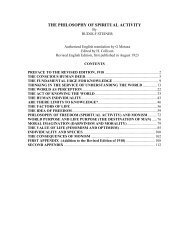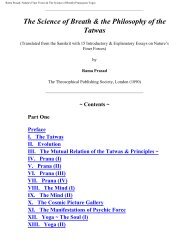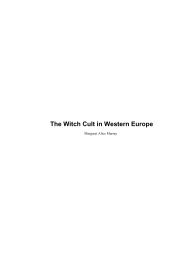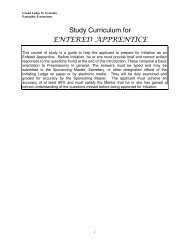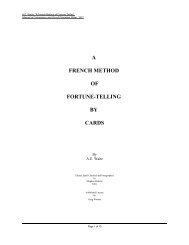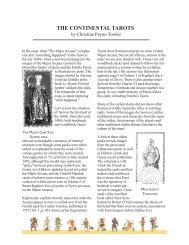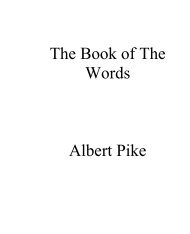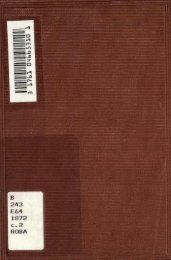You also want an ePaper? Increase the reach of your titles
YUMPU automatically turns print PDFs into web optimized ePapers that Google loves.
The Legend Of RA And Isis.<br />
"Sonnensagen," Religion der alten Aegypter, Münster, 1890, p. 29 ff.<br />
2 A similar difficulty also exists in Hebrew, for elomhim means both God and "gods"; compare Psalm lxxxii., i.]<br />
{p. xcii}<br />
unity <strong>of</strong> a supreme and self-existent being, his eternity, his almightiness, and external reproduction<br />
<strong>the</strong>reby as God; <strong>the</strong> attributing <strong>of</strong> <strong>the</strong> creation <strong>of</strong> <strong>the</strong> world and <strong>of</strong> all living beings to this supreme God;<br />
<strong>the</strong> immortality <strong>of</strong> <strong>the</strong> soul, completed by <strong>the</strong> dogma <strong>of</strong> punishments and rewards: such is <strong>the</strong> sublime<br />
and persistent base which, notwithstanding all deviations and all mythological embellishments, must<br />
secure for <strong>the</strong> beliefs <strong>of</strong> <strong>the</strong> ancient Egyptians a most honourable place among <strong>the</strong> religions <strong>of</strong><br />
antiquity."[1] Nine years later he developed this view, and discussed <strong>the</strong> difficulty <strong>of</strong> reconciling <strong>the</strong><br />
belief in <strong>the</strong> unity <strong>of</strong> God with <strong>the</strong> poly<strong>the</strong>ism which existed in Egypt from <strong>the</strong> earliest times, and he<br />
repeated his conviction that <strong>the</strong> Egyptians believed in a self-existent God who was One Being, who had<br />
created man, and who had endowed him with an immortal soul.[2] In fact, de Rougé amplifies what<br />
Champollion-Figeac (relying upon his bro<strong>the</strong>r's information) wrote in 1839: "The Egyptian religion is a<br />
pure mono<strong>the</strong>ism, which manifested itself externally by a symbolic poly<strong>the</strong>ism."[3] M. Pierret adopts <strong>the</strong><br />
view that <strong>the</strong> texts show us that <strong>the</strong> Egyptians believed in One infinite and eternal God who was without<br />
a second, and he repeats Champollion's dictum.[4] But <strong>the</strong> most recent supporter <strong>of</strong> <strong>the</strong> mono<strong>the</strong>istic<br />
<strong>the</strong>ory is Dr. Brugsch, who has collected a number <strong>of</strong> striking passages from <strong>the</strong> texts. From <strong>the</strong>se<br />
passages we may select <strong>the</strong> following:--<br />
God is one and alone, and none o<strong>the</strong>r existeth with Him--God is <strong>the</strong> One, <strong>the</strong> One who hath made all<br />
things--God is a spirit, a hidden spirit, <strong>the</strong> spirit <strong>of</strong> spirits, <strong>the</strong> great spirit <strong>of</strong> <strong>the</strong> Egyptians, <strong>the</strong> divine<br />
spirit--God is from <strong>the</strong> beginning, and He hath been from <strong>the</strong> beginning, He hath existed from old and<br />
was when nothing else had being. He existed when nothing else existed, and what existeth He created<br />
after He had come into being, He is <strong>the</strong> Fa<strong>the</strong>r <strong>of</strong> beginnings--God is <strong>the</strong> eternal One, He is eternal and<br />
infinite and endureth for ever and aye--God is hidden and no man knoweth His form. No man hath been<br />
able to seek out His likeness; He is hidden to gods and men, and He is a mystery unto His creatures. No<br />
man knoweth how to know Him--His name remaineth hidden; His name is a mystery unto His children.<br />
His names are innumerable, <strong>the</strong>y are manifold and none knoweth <strong>the</strong>ir number--God is truth and He<br />
liveth by truth and He feedeth <strong>the</strong>reon. He is <strong>the</strong> king <strong>of</strong> truth, and He hath stablished <strong>the</strong> earth<br />
<strong>the</strong>reupon--God is life and through Him<br />
[1. Études des Rituel Funéraire des Anciens Égyptiens (in Revue Archéologique), Paris, 1860, p. 72.<br />
2. La croyance à l'Unité du Dieu suprême, à ses attributs de Créateur et de Législateur de l'homme, qu'il a doué d'une âme<br />
immortelle; voilà les notions primitives enchâssées comme des diamants indestructibles au milieu des superfétations<br />
mythologiques accumulées par les siècles qui ont passé sur cette vieille civilization. See Conference sur la Religion des<br />
anciens Égyptiens (in Annales de Philosophic Chrétienne, 5 ième Série, t. xx., Paris, 1869, pp. 325-337).<br />
3. Égypte, Paris, 1839, p. 245, col. 1.<br />
4. Le Panthéon Égyptien, Paris, 1881, p. 4.]<br />
{p. xciii}<br />
only man liveth. He giveth life to man, He brea<strong>the</strong>th <strong>the</strong> breath <strong>of</strong> life into his nostrils--God is fa<strong>the</strong>r and<br />
mo<strong>the</strong>r, <strong>the</strong> fa<strong>the</strong>r <strong>of</strong> fa<strong>the</strong>rs, and <strong>the</strong> mo<strong>the</strong>r <strong>of</strong> mo<strong>the</strong>rs. He begetteth, but was never begotten; He<br />
produceth, but was never produced; He begat himself and produced himself. He createth, but was never<br />
http://www.sacred-texts.com/egy/ebod/ebod07.htm (3 <strong>of</strong> 10) [8/10/2001 11:23:38 AM]



